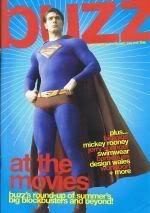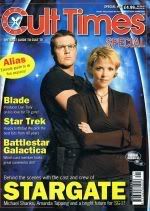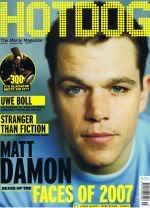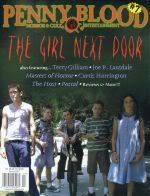Interview with James Moran
There's nothing like a team-building trip to the great outdoors with your work colleagues to make you hate your job. Really, really hate your job. Quite whose sadistic idea it was to make employees suffer one another's company outside of the office is unclear, but the group of reluctant pen-pushers in Severance find they have more to worry about than just playing paintball in the woods. Their trip to Hungary starts off badly -- the bus breaks down, the driver abandons them in the middle of nowhere, and the luxury lodge is nowhere to be found -- and gets progressively much, much worse. Unseen hunters lurking in the forest start picking them off, one by one, and suddenly there's far more at stake than just the annual salary review.
Director Chris Smith has already made a name for himself with his 2004 debut Creep, a nasty little story of a monster on the London Underground. Severance, though, is different: despite all the gore and severed limbs, it's also uproariously funny. The cast is comprised of several recognisable faces from British comedy -- Tim McInnerny of Blackadder fame, and Mean Machine's Danny Dyer, for example -- and relative unknowns, as well as Dead Like Me's Laura Harris, the token non-Brit. It's clever, but not above the odd gleefully stupid moment, and several scenes that go far beyond the bounds of good taste.
Severance was released on DVD in the UK this week, so it seemed like a good time to interview screenwriter James Moran. Especially since this is the 100th post on this blog...
What was it like first seeing the film come alive - did you visit the set while it was filming?
I was on set once, for about a week. It was my first big film set, and it was incredible. I did actually kind of – I’ve said this several times but no one believes me – I did get quite emotional. I had to go and have a little cry to myself because I was so excited! The first thing I saw when I arrived on set was that people had just been cast that I didn’t know about. I looked at the monitor and I’d never seen these people before, and it was like, that’s Gordon! And that’s Jill! And they’re saying the things Gordon and Jill say! I had to sit down for a minute; it was quite weird. I just couldn’t quite believe it was really happening.
You have a blog (http://jamesmoran.blogspot.com) – which may or may not be the first British screenwriting blog…
It is! That I know of, anyway. To my knowledge, it is the first.
Did you start writing that as a record for yourself, or as a guide for other people, or was it a bit of both?
Yeah, it was partly both. I started when I was halfway through the writing of Severance. It was 2003 and I thought I had a good shot at making a go of something. So I thought if I keep a journal of it, it’ll be for myself, and also, I found nothing online about people from the UK who’d had something made and were talking through the process. I thought, if anyone’s interested, they could read about my struggles to become a writer. And then it got sold, and I thought, that’s even better, now I can document the whole process! It was more about me at the start and then it became more for other people. Now, people are emailing and saying like it’s inspiring to read about someone who’s made it!
Do you give them advice?
I try not to give writing advice because, well, what do I know? If I do give advice, I’ll say ‘this is what I do and it works for me’ but it is by no means ‘this is how you write.’ But if people ask me, you know, ‘what was this like?’ or ‘what was that like?’ then I’ll answer anything people ask, to shed some light on the whole process. [The industry] is kind of all closed off before you get into it; if you’re not in it it’s like a concrete wall, so I thought I could demystify it.
Had you met Chris Smith before he signed on to direct?
Well, no; he was already in talks to direct. I met him after the Creep screening [at FrightFest 2005] and he really wanted to do it. I liked Creep, it was good fun; it was just a nasty little shocker that did what it wanted to do. So I came out all set to tell him I liked his movie and he just came over, opened his mouth and [makes hand gesture to illustrate an outpouring from the mouth]. You know, you don’t talk to Chris, you just sort of stand there, he shouts for five minutes and disappears! He was all “I really like the script and I wanna do this and I wanna do that and blah blah blah anyway, see you later!” I was like, ‘okay, yeah, nice one.‘ I didn’t get to say a word! Just stood there like an idiot.
Speaking of FrightFest, you’ve been going for years and years; you’re obviously a horror fan, did you always want to write a horror script?
I did want to do horror, but it was just kind of chance that it happened to be the first one I did. I’d been trying to get my writing career going, I had a few ideas and that was one of them, and my agent said it was the best idea. Also, I thought, for my first film I want to do something quickly, and I thought, I know horror inside out, so it’ll be easy. Famous last bloody words!
What was it like going from being in the audience at FrightFest to going up on stage and doing the Q&A and being ‘the talent’?
It was the weirdest thing I’ve ever done in my life. I was sitting there watching this thing I wrote, with people clapping and cheering, but I was still an audience member. Then when they did the Q&A at the end, I didn’t want to get up because I was scared. Partly because there were six hundred people looking at me, and partly because I was thinking, I’m not going to be the audience member any more, I’m going to be someone else. As though I’d suddenly be famous and wouldn’t be able to go to FrightFest any more, because I’d be mobbed! They’d all be asking for my autograph… Not that they’d remember, because I’m not an actor.
Yeah, people tend to only recognise the people they’ve been watching on screen for the past two hours…
Which is good! So, in that moment where Chris got the microphone and called my name, I just looked at my friends, and they were like ‘go on!’ so I stood up… and it was like I was still in my seat, I stood up like I was in a dream, walking to the stage, and I could see people in the audience clapping and looking like ‘isn’t that some nobody?’ So it was weird, I was trying to tell people afterwards about that moment, but I was drunk; that moment when I went from being an audience member to being a filmmaker, and when I was on stage I could feel myself sort of in the audience watching. It was very strange. So, ‘very strange’, is what you’ll edit all that down into.
‘Very strange, full stop!’ Anyway, on your blog you said that a first-time writer shouldn’t direct, and a first-time director shouldn’t write. Was that comment made about something in particular?
I knew that would bite me on the arse! It’s more of a guideline; it was that year where there’d been a lot of indie, digital, low-budget films from first time writer-directors. And half of them were like, your script’s alright, but you can’t direct, and the other half were like, your script is shit but you’re quite a good director…
You know, anyone can make a film now. It’s great because I’ve seen a lot of cool stuff that I’d never have seen otherwise, but it’s like when the Internet first came out and suddenly anyone can have a website. Now anyone can be a director, and there’s no quality control. So, just show the script to your mate, you know, your sarcastic friend who doesn’t like anything, and then just give it another draft…
Did you ever have ambitions to direct?
I did have ambitions to direct, at one stage. But having seen the two-year process, from beginning to end, with Severance I just kind of thought, fuck that. I’ve never worked so hard in my life as I did on the script for Severance, but when I finished writing it and they started making the film, it was like my job was finished. And then they had to do all the pre-production, they had to do all the casting, they had to do all the location scouting, to go on set, all the arguments, this works, this doesn’t work, editing and effects and the sound mix wasn’t working… I turned up to the sound mix because I’m really into sound effects and sound editing, so I was dying to see it. I lasted about an hour before I was like ‘you know what, I’ve got to shoot off now…’ because, Jesus, they were doing the same bit over and over and over again! It’s not that I don’t want to put the work in or anything, but it’s two years when you can’t do anything else. You can’t even watch telly! It’s just like that’s it. I like to be able to do something and then to go and do something else. But I’m not ruling it out!
The title of the movie changed several times; how did you finally come up with Severance?
I’m useless with titles. Originally, it was called Mountain Man, because there was a big mountain man in it, but that was rubbish. So I took him out, and then I had to call it something else. P45 was my agent’s idea, which is a good title, non-specific, but it wouldn’t work in America. I knew the title would have to change, but nobody said anything until quite late in the process, so I said to them, ‘you’re going to change the title, aren’t you?’ And they said they were trying to think of one. Titles and character names, I’m no good at, I can’t think of them. We had about two months of everybody, including the temps and runners thinking of titles for it. Everything I came up with sounded like Stephen Seagal films, like Extreme Prejudice! Eventually, I don’t know who it was, someone in the office suggested Severance. It was the best one there was, so we went with it. It took about a week for us to realise it meant two different things, and that it was clever.
Severance is funny as well as being scary and gory; black humour is kind of your thing, isn’t it? Was any of it suggested by other people along the way? Did they want it made funnier?
Originally, the draft I sold was pretty much half and half. The first half was all jokes, the second half was all horror – with some jokes. But it actually became less funny over the process, it was actually more about toning it down and keeping it as low-key as possible. I did two rewrites for the film company, and I did a rewrite based on Chris’s notes, and then after that Chris and I started working on it together, sending it back and forth and just kind of thrashing it out. After that part, I’d call him up or he’d call me up; there are lots of things in it that one of us thought of one night, some of it’s in there and some of it isn’t.
Things that only seemed like a good idea at the time?
Yeah, there was a whole bit we got halfway through writing which was when Steve’s tripping in the woods, and there was a sequence where he sits down and watches this weird thing that’s like someone’s staging a musical in the woods. We thought it was hilarious and I started writing it, and then I got halfway through and realised it was shit. So I phoned Chris and before I said anything he said ‘it’s bollocks, isn’t it?’ and it was like, yeah, so it was just like that, coming up with random stuff and seeing if it works.
So what are you working on now? Something called Curfew, right?
Yeah; Curfew, I am doing revisions on the first draft and I’m hoping to have it done by mid-December because that’s when the director, Paul Andrew Williams, is free to have a look at it. He’s working on something else from the end of December to March, and he’ll be incommunicado. Then in March he’s ours. They want to shoot it in winter though, because it’s all set in one long night, and it’s set in London. It’s really expensive to shoot in London so you want to make as much of the time as you can. I can’t go into the plot details, but it’s a horror, and it’s not a comedy horror, it’s a really nasty, shocking horror. I keep calling it my 70s John Carpenter movie; it’s that kind of vibe, dark and moody and gritty with lots of death and lots of gore.
IMDB link; Severance at Play.com.










4 comments:
John Carpenter's '70s were not gorey. I hate gore. It does the opposite of scare you. It just disgusts you.
I phrased that badly, didn't mean to imply that they were gory. For clarity: "I keep calling [Curfew] my 70s John Carpenter movie; [Curfew has] that kind of vibe, [Curfew is] dark and moody and gritty with lots of death and lots of gore." I meant that it had the 70s Carpenter feel, with added mayhem and splatter. I agree that gore isn't scary, but due to the nature of the plot, there are both scares and gore in Curfew.
Reading the whole thing again, I like, realise I say "like", like, a *lot*, like...
It is really weird when you read yourself back in print. I tend to sound nothing like me.
I absolutely love Carpenter, and his 80s movies got a bit more gorey starting with his bits for Halloween 2, and the The Fog and on and on, but his 70s films were a little more subtle.
I think Carpenter's films have an atmosphere that only a director can bring though. The mood is hard to convey on paper until the pauses are filmed, and the music is layered in.
I'm looking forward to Curfew, but I hate gorey films. They just don't work for me, which is why Romero is not the Godfather of horror for me, it's Carpenter.
I take that back. I love The Thing and that was pretty gorey, but nothing like what I think of when I think gore. Gore to me is Cannibal Holocaust, anything with gouging, and organ displacement. :)
Post a Comment